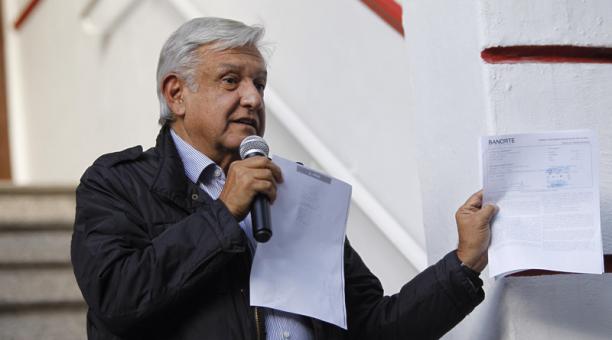
A Populist President
The third time’s the charm for populist candidate Andrés Manuel López Obrador. After unsuccessful campaigns in 1994 and 2006, he has now become Mexico’s newest president, winning 53 percent of the vote.
Considered an unconventional choice by many, Lopéz Obrador, who will take office December 1, eschewed existing party platforms and created his own: the MORENA Party, which positions itself against what it portrays as the political elite.
Earlier this month, the president-elect met with members of the Trump administration, including U.S. Secretary of State Michael Pompeo, Treasury Secretary Steven Mnuchin and Homeland Security Secretary Kirstjen Nielsen.
López Obrador will be the first Mexican leftist president in decades, even as much of Latin America — and the larger West — is moving further to the right. Among his ambitious plans are to prioritize the poor, put a stop to government corruption and fight drug-related violence, which has killed an estimated 80,000-100,000 in Mexico since 2006. How he’ll actually implement those plans, however, remains rather vague.
So, what makes this López Obrador’s particular moment in time, and what does his election mean for Mexico — and for the United States?
According to Ralph Armbruster-Sandoval, a professor of Chicano and Chicana studies at UC Santa Barbara, the answer is simple: “People are angry. They’re fed up with the corruption and the violence, the unemployment and the inequality.”
Other UCSB scholars agree. Drugs, and the violence they cause, are among the primary forces behind López Obrador’s election. “Mexico is suffering from a tremendous wave of violence, and people are willing to do almost anything to stop it,” said Kathleen Bruhn, a professor of political science and an expert on Latin American governments. In addition, government corruption is rife, she noted, and about 44 percent of Mexicans currently live in poverty.
“The overwhelming majority of Mexicans have become frustrated and have given up hope in the other two parties — the PRI and the PAN,” said Mario García, a professor of Chicano and Chicana studies and of history. “They’ve turned to another alternative that’s expressing an anti-establishment and anti-elitist point of view.”
Added Armbruster-Sandoval, “The president-elect represents a more progressive vision in Mexico that hasn’t been seen since the 1930s. It’s like FDR winning in the United States today.”
William Robinson, a sociology professor who studies Latin American politics, said that Mexico made a sharp turn towards ultraconservative politics beginning in 1982, focusing on transnational investment in trade and the privatization of oil, finance and education.
Robinson explained that López Obrador doesn’t want to abandon NAFTA, often cited as the prime example of the kind of deregulated, privatized system that Mexico previously embraced. But he does want to renegotiate it, and to implement a number of social programs to combat the problems the current political system has created. “He’s promised free education for everyone, a public health pension for the retired and disabled — that’s what makes him a leftist,” Robinson said.
And, he noted, López Obrador will face his fair share of challenges. For one thing, “he’s moved from the left to the center in terms of his financial policy, so it’s not clear how he will finance all of this,” Robinson pointed out. “He’s not going to tax the wealthy and corporations more than they’re already being taxed.”
López Obrador also doesn’t have close ties to political elites, a fact that Armbruster-Sandoval suggested may hurt him. “It’s one thing to have political power, but it’s another to be able to do something with it. Those in economic power can go on strike, people can pull their investments out of Mexico,” he said.
And while López Obrador’s party has picked up a majority of seats in Congress, Bruhn argued that in reality that might not make things easier. The MORENA party is actually a coalition that includes two parties usually in opposition — the liberal PT and the evangelical PES — along with sections of other parties that López Obrador persuaded to join him. “He went around and he made deals with local politicians and offered to support them in exchange for them supporting him,” she said. “Now, he’s going to have to put together a team that’s going to work well for him.”
One of the biggest issues facing López Obrador, according to researchers, is Mexico’s fraught relationship with the United States, which they say has become tense as a result of Trump’s negative attitude toward NAFTA and hardline stance on immigration. But on NAFTA, they note, Trump and López Obrador don’t always disagree. Trump, like the Mexican president-elect, wants salaries in Mexico to rise so that fewer people will want to immigrate, according to Bruhn.
However, they may come to an impasse on immigration more generally, she said: “Lopez has no reason to want to stop immigration, and he doesn’t want to do the United States’ dirty work.”
Their reactions to López Obrador’s election ranged from cautious optimism to strong skepticism, but the scholars all generally agree on one point: Mexico is in the midst of a profound transition.
“It might be a successful presidency,” Robinson said. “But his party has sparked this mass mobilization of social movements: students, poor people, indigenous people.” An increasingly disadvantaged populace has increasingly begun to speak out and organize against the loss of indigenous groups’ land, privatization, corruption and lack of economic opportunity, he noted, adding, “That, for me, is the most important, most optimistic thing that’s coming out of this election.”



